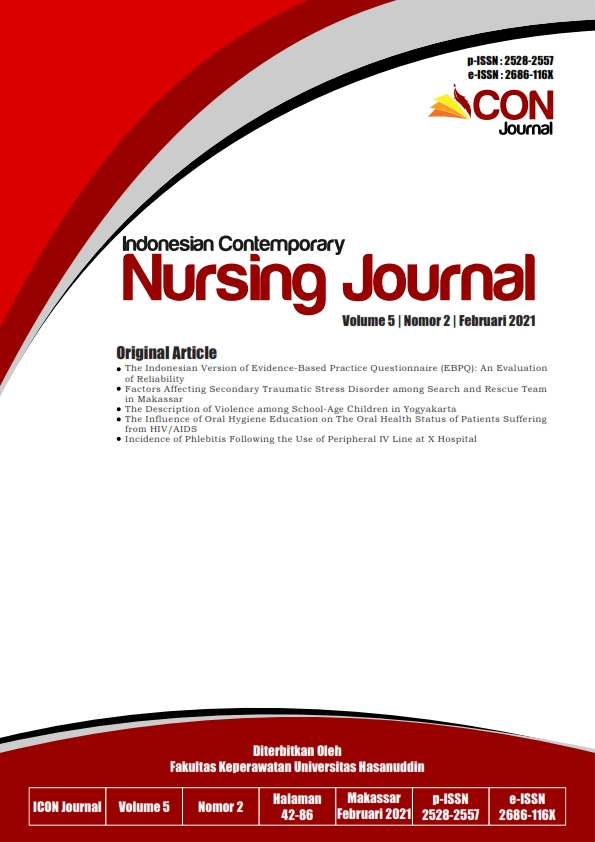Health Education Intervention on Husbands’ Perception Towards Participation in Reproductive Health Services
DOI:
https://doi.org/10.20956/icon.v8i2.27843Keywords:
health education intervention, husbands’ participation, reproductive health servicesAbstract
Aims: The study was conducted to determine the effect of husbands' participation in reproductive health education on the spousal utilization of maternal health services in Kaduna North Senatorial District, Kaduna state.
Methods: A Quasi-experimental study design was used. The study group had a pre-intervention followed by an intervention (health education) of two sessions which lasted for thirty minutes each with an interval of four weeks between them. Then a post-intervention test after nine months. The researcher used a multistage sampling technique in the selection of towns and a systematic sampling technique for the selection of participants, a questionnaire was used to collect data.
Results: The result shows a statistically significant positive change in husbands’ perception regarding participation in their spouses’ utilization of reproductive health services (p<0.05) with mean change from 2.79±0.405 pre-intervention to 3.11±0.540 post-intervention.
Conclusion: Intervention improved husbands 'perception of participation in spouses' utilization of reproductive health services. The study recommended the integration of a module on husbands' participation in reproductive health services in the healthcare packages for prospective husbands and those with wives as well as those cohabiting to improve their perception and participation in reproductive health services.
References
Artal-Mittelmark, R. (2022), Overview of High Risk Pregnancy. MSD Manual: Professional Version. Accessed at https://www.msdmanuals.com/professional/gynecology-and-obstetrics/high-risk-pregnancy
Babalola, S., & Fatusi, A. (2009). Determinants of use of maternal health services in Nigeria--looking beyond individual and household factors. BMC pregnancy and childbirth, 9, 43. https://doi.org/10.1186/1471-2393-9-43
Chibango, V., & Maharaj, P. (2018). Men's and women's roles in decision making about abortion in the context of HIV. The European journal of contraception & reproductive health care : the official journal of the European Society of Contraception, 23(6), 464–470. https://doi.org/10.1080/13625187.2018.1541078
Falade-Fatila, O. & Adebayo, A.M. (2020). Male partners’ involvement in pregnancy related care among married men in Ibadan, Nigeria. Reprod Health 17, 14 https://doi.org/10.1186/s12978-020-0850-2
Gathuto, M. N. (2014). Factors Influencing Male Participation in Antenatal Care In Kenya: A Case Of Kenyatta National Hospital, Nairobi, Kenya (Master thesis). http://erepository.uonbi.ac.ke/handle/11295/74173
Gopal, P., Fisher, D., Seruwagi, G. et al. (2020). Male involvement in reproductive, maternal, newborn, and child health: evaluating gaps between policy and practice in Uganda. Reprod Health 17, 114 https://doi.org/10.1186/s12978-020-00961-4
Gulumbe, U., Alabi, O., Omisakin, O.A. et al. (2018) Maternal mortality ratio in selected rural communities in Kebbi State, Northwest Nigeria. BMC Pregnancy Childbirth 18, 503. https://doi.org/10.1186/s12884-018-2125-2
Kriel, Y., Milford, C., Cordero, J., Suleman, F., Beksinska, M., Steyn, P., & Smit, J. A. (2019). Male partner influence on family planning and contraceptive use: Perspectives from community members and healthcare providers in KwaZulu-Natal, South Africa. Reproductive Health, 16(1), 1–16. https://doi.org/10.1186/s12978-019-0749-y
Lewis, S., Lee, A., & Simkhada, P. (2015). The role of husbands in maternal health and safe childbirth in rural Nepal: a qualitative study. BMC pregnancy and childbirth, 15, 162. https://doi.org/10.1186/s12884-015-0599-8
Lusambili, A. M., Muriuki, P., Wisofschi, S., Shumba, C. S., Mantel, M., Obure, J., Nyaga, L., Mulama, K., Ngugi, A., Orwa, J., Luchters, S., & Temmerman, M. (2021). Male Involvement in Reproductive and Maternal and New Child Health: An Evaluative Qualitative Study on Facilitators and Barriers From Rural Kenya. Frontiers in public health, 9, 644293. https://doi.org/10.3389/fpubh.2021.644293
Maluka, S. O., & Peneza, A. K. (2018). Perceptions on male involvement in pregnancy and childbirth in Masasi District, Tanzania: A qualitative study. Reproductive Health, 15(1), 1–7. https://doi.org/10.1186/s12978-018-0512-9
National Population Commission - NPC/Nigeria and ICF. 2019. Nigeria Demographic and Health Survey 2018. Abuja, Nigeria, and Rockville, Maryland, USA: NPC and ICF.
Rahman et al. (2018). Knowledge and involvement of husbands in maternal and newborn health in rural Bangladesh BMC Pregnancy and Childbirth (2018) 18:247 https://doi.org/10.1186/s12884-018-1882-2
Salim, Y.M., Stones, W., (2020) Determinants of exclusive breastfeeding in infants of six months and below in Malawi: a cross sectional study. BMC Pregnancy Childbirth 20, 472 (2020). https://doi.org/10.1186/s12884-020-03160-y
Sharma, S., Kc, B., & Khatri, A. (2018). Factors influencing male participation in reproductive health: a qualitative study. Journal of multidisciplinary healthcare, 11, 601–608. https://doi.org/10.2147/JMDH.S176267
Sharma, V., Leight, J., Giroux, N. et al. (2019) “That’s a woman’s problem”: a qualitative analysis to understand male involvement in maternal and newborn health in Jigawa state, northern Nigeria. Reprod Health 16, 143 https://doi.org/10.1186/s12978-019-0808-4
Tokhi M, Comrie-Thomson L, Davis J, Portela A, Chersich M, Luchters S (2018) Involving men to improve maternal and newborn health: A systematic review of the effectiveness of interventions. PLoS ONE 13(1): e0191620. https://doi.org/10.1371/journal.pone.0191620
Wicaksono, F. (2016). Impact of husband’s participation in antenatal care on the use of skilled birth attendant. Jurnal Kesehatan Masyarakat Nasional, 10(4), 162–168. https://doi.org/10.21109/kesmas.v10i4.520
Wilunda, C., Scanagatta, C., Putoto, G., & Montalbetti, F. (2017). Barriers to utilisation of antenatal care services in South Sudan: a qualitative study in Rumbek North County. Reproductive Health, available at; https://doi.org/10.1186/s12978-017-0327-014:65.
Yargawa, J., & Leonardi-Bee, J. (2015). Male involvement and maternal health outcomes: systematic review and meta-analysis. Journal of epidemiology and community health, 69(6), 604–612. https://doi.org/10.1136/jech-2014-204784
Downloads
Published
How to Cite
Issue
Section
License
Authors who publish with this journal agree to the following terms:Authors retain copyright and grant the journal right of first publication with the work simultaneously licensed under a Creative Commons Attribution License that allows others to share the work with an acknowledgement of the work's authorship and initial publication in this journal.
Authors are able to enter into separate, additional contractual arrangements for the non-exclusive distribution of the journal's published version of the work (e.g., post it to an institutional repository or publish it in a book), with an acknowledgement of its initial publication in this journal.
Authors are permitted and encouraged to post their work online (e.g., in institutional repositories or on their website) prior to and during the submission process, as it can lead to productive exchanges, as well as earlier and greater citation of published work (See The Effect of Open Access).



